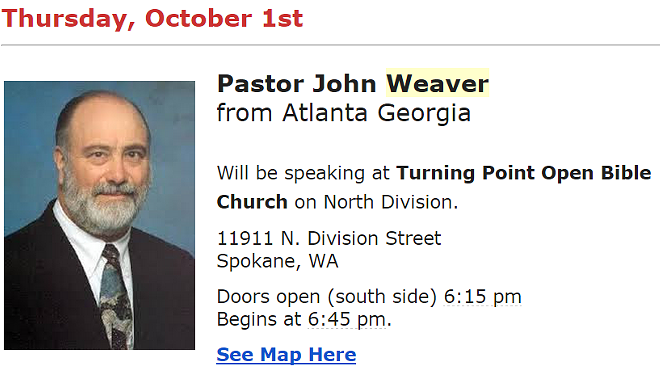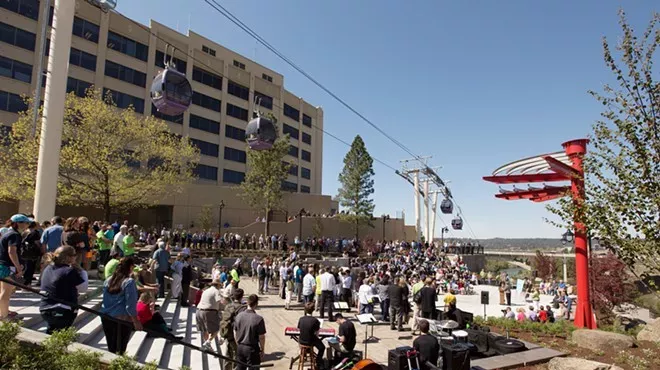Tuesday, August 15, 2017
Why East Wenatchee has a "Robert E. Lee Elementary School" — and why it won't be changing its name

Robert E. Lee Elementary School website
Wenatchee's Eastmont School District had the debate over changing the name of Robert E. Lee Elementary School two years ago; it decided to keep the name as is. ""That’s part of our history," said Superintendent Garn Christensen.
In East Wenatchee, the Eastmont school district honors both sides. Like Spokane, it has an elementary school named after Gen. Ulysses S. Grant, our 18th president.
But to the north, ironically, it also has a Robert E. Lee Elementary school, named after the general who led the Confederate States of America's army against Ulysses S. Grant. As the debate over removing statues of prominent Confederate figures like Lee rages, especially in the wake of the white supremacist rally in Charlottesville, Virginia, the name of Lee Elementary has been thrust, once again into the controversy.
"Once again" because Eastmont just had this debate two years ago. In 2015, in the aftermath of the Charleston massacre by a Confederate-flag-loving white supremacist, media outlets pointed to the more than 200 public schools named after Confederate leaders across America.
The issue cropped up in East Wenatchee as well. And as the board wrestled with it and East Wenatchee citizens debated it on social media, the comments
"Ninety percent of them wanted to continue it the way it has been," he says. Back then, the school board considered the comments and made a decision.
"They’ve had some conversations and have determined not to change the name," Christensen says. "That’s part of our history. They don’t have the desire to participate with what some describe as the 'whitewashing' of the history. "
The reputation of Lee seemed to be a factor as well.
"My recollection is that Robert E. Lee was an honorable man,” Eastmont school board member Chris Gibbs, who had attended Lee Elementary as a kid, told the Wenatchee World in 2015. “The Civil War was a defining part of our history. I think if you cover up all of what we were that takes away from what we’ve become. I don’t want our country to forget who we were.”
The odd thing, of course, is that Washington state didn't exactly have a stake in the Civil War. It wasn't even a state when it was fought, from 1861 to 1865. In fact, look at this map, put together by Mother Jones, of schools with Confederate names. Look how lonely that orange dot looks all the way over in the upper left-hand corner.
But East Wenatchee did have a connection to the South, Christensen says. During the Dust Bowl era, farmers, many of them Southern migrants, flocked to the region.
"I think this was part of their culture," Christensen says.
According to 2015Wenatchee World reporting, Grant Elementary, named in 1953, came first. But back then, it wasn't named after General Grant — just Grant Road, which had been named after Aubrey Grant, who owned an orchard nearby. (Only later was it changed to Ulysses S. Grant Elementary.)
When a new elementary school was built in 1955, in a decision reminiscent of the Missouri Compromise, the new elementary school was named after Robert E. Lee as a favor to residents who'd come from the South.
“There were a lot of people living up here from the South. It was a political decision more than a tribute to General Lee,” assistant superintendent Beverly Jagla told the World. “They were just trying to keep everybody happy."
The timing matches the trend of Confederate monuments and symbolism spiking during the years of the Civil Rights movement.
Nearly half of the students in the Eastmont school district are Hispanic or Latino, but the district has very few black students. In fact, during the 2015-16 school year, according to state reporting, there were no black students at Robert E. Lee.
Still, Christensen says that he has, in previous years, heard from people who raised concerns regarding whether minority students would feel uncomfortable about attending a school named after a general who led an
"We have heard from some families that, yes, shared those same or similar concerns," Christensen says.
From an educational perspective, however, he says this debate is valuable.
"Just the conversation itself causes people to delve into and understand more about the time and the area and the people and their personalities," Christensen says.
Precisely how much villainy to ascribe to Lee remains a source of debate among historians and pundits. Some argue that, despite fighting for a despicable cause and a toxic institution, Lee retained elements of nobility, noting in particular that he dissuaded Southerners from launching an insurgency after the war was lost.
But writing for the Atlantic, Adam Serwer argued that the image of General Lee as an honorable man is where the whitewashing happened. Beyond simply leading a treasonous war — the bloodiest in American history — to preserve slavery, Serwer writes that Lee was a monster.
He owned slaves. He beat them or had them beaten. He broke up families by hiring his slaves off to other plantations. During the Civil War, his army kidnapped free black men and placed them into slavery. It slaughtered black Union soldiers who attempted to surrender.
While he suggested in letters that slavery was an evil institution, Lee also argued that it was the South's Christian duty to keep blacks enslaved, Serwer writes. For their own good
"The blacks are immeasurably better off here than in Africa, morally, socially & physically," Lee wrote in one letter.
Slate's Jamelle Bouie echoed Serwer's comments on Twitter today.
"There is literally no other reason to venerate Robert E. Lee than as leader of Confederate military forces ... There is nothing complicated about the Confederacy. It was evil, and its leaders fought for an evil cause."
Ironically, Lee himself opposed monuments to the Confederacy, writing that it would hurt the country's ability to heal. "However grateful it would be to the feelings of the South, he wrote about one proposal, "the attempt in the present condition of the Country, would have the effect of retarding, instead of accelerating its accomplishment; [and] of continuing, if not adding to, the difficulties under which the Southern people labour.”
At the Eastmont School District, Christensen says he has started receiving comments again about the elementary school's name.
"I’ve been getting emails from various people," he says. But as he responds to them, he wants to make it clear that this is the decision of the school board, not him personally.
"I don’t want this to be an article about my beliefs. In these situations, I want to be as neutral as I can," Christensen says. "If you work as a school administrator and you work with a community, you work within their community and their preferences."
Christensen says that, as a superintendent in other communities, he's been through controversies over schools with Native American names as well.
"I’d rather not be in the news for this," Christensen says. "But sometimes you don’t choose what you can be in the news for."
Here's the email that Christensen is sending to people who raised concerns.
Dear ...,
Your concerns have been shared before and we have no known record of the conversation that occurred at the time the school was named. Several years ago there was a public request made of our Board to discuss changing this name. When the topic was brought up as potential agenda topic, there was a rapid and overwhelming community response to keep the name. Many reasons were given including opinion that it is important for our students to understand the people and emotions of that era and not remove these prompts.
Others shared it is "whitewashing" our history and not engaging in conversations that some people would rather avoid. The news article that discussed this issue received hundreds of comments with probably 90%+ indicating a preference to keep the name. Given this information, our Board chose to not address the name, and as a result we continue to have Robert E. Lee Elementary. During this time, some interesting articles on Robert E. Lee were frequently referenced as well as articles on other early US leaders such as Washington, Jefferson, and Grant who were slaveholders, yet continue to be revered.
Please know I will share your email and this response with our Board of Directors. If you would like to address them on this topic, they do allow public comment at the start of each Board Meeting. Upcoming meetings are August 21 and September 11 starting 5:30 PM. Both meetings will be at our District Office located at 800 Eastmont Avenue.
Sincerely,
Garn Christensen
Tags: Civil War , East Wenatchee , Eastmont School District , Robert E. Lee Elementary School , News , Image

























